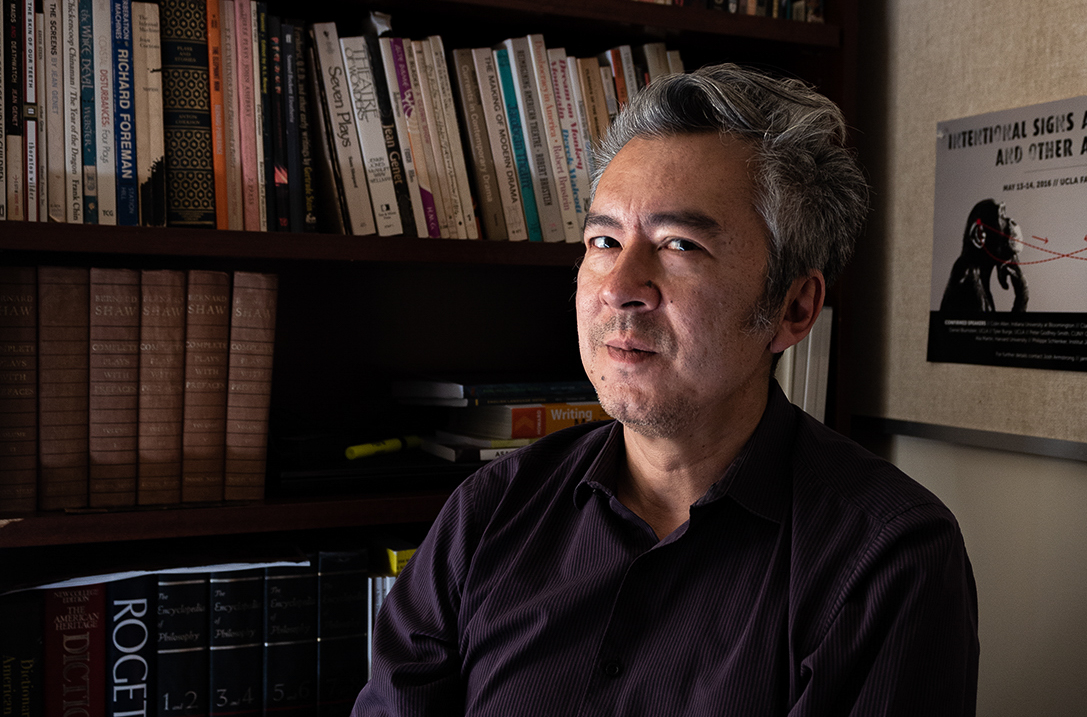Professor gives new sound, vigor to French poems in his translations

English associate professor Brian Kim Stefans is working on a book entitled “Festivals of Patience: The Verse Poems of Rimbaud,” in which he translates the work of French poet Arthur Rimbaud. While translating, Stefans said he aims to preserve the intended sounds and rhythms of each poem. (Kanishka Mehra/Assistant Photo editor)
By Alyssa Block
Feb. 17, 2020 11:20 p.m.
English associate professor Brian Kim Stefans said his translations of Arthur Rimbaud will give new light to the rebel, revolutionary and intellectual.
Stefans is in the process of publishing a book of these translations entitled “Festivals of Patience: The Verse Poems of Rimbaud,” after one of Rimbaud’s poems. For these translations, Stefans said he aims to preserve the sound and rhythm of the poems as the poet intended – something past translations have failed to accomplish. Stefans has translated all of Rimbaud’s verse poems and said he has attempted to add something of his own to every poem he translates to make them memorable.
“The desire to innovate, to create new techniques, to incorporate things that have never been done before, I think Rimbaud is emblematic of that,” Stefans said. “I want Rimbaud to be that reminder of innovation and change and what I’d like to call fire. We should all have that.”
[Related: UCLA’s newest poet-in-residence to explore intersection of storytelling and law]
Stefans said his focus on Rimbaud is due to both the poet’s lasting influence and his fascinating life story. Rimbaud wrote the majority of his works in just five years, leaving poetry behind at age 21. In the poet’s eccentric life story, he ran away from home multiple times and he had an affair with a much older married poet named Verlaine, Stefans said.
Additionally, Rimbaud’s works were revolutionary for his time, breaking away from the traditional, conservative model of French poetry, Stefans said. The poet disregarded the staunch Alexandrine style of poetry, whose meter is characterized by iambic lines with 12 syllables that stem from French heroic verse. Rimbaud was also unorthodox because he cared about issues surrounding science, politics and the working class. Rimbaud was at once a rebel as he left tradition behind, but also insightful and talented, Stefans said.
“(Rimbaud) is this combination of a cruel, crude abject character, but also maintained this visionary aspect about him,” Stefans said. “It’s this weird combination of all these things that make him kind of fascinating.”
However, though Stefans is undertaking a translation of the complex French syntax of Rimbaud’s poetry, he is not fully fluent in French. Stefans said for his translations, he relies upon an online French dictionary and past translations of Rimbaud to get an accurate rendering of each poem’s content and the sound. Because the syntax of Rimbaud’s poems can become extremely complicated, many interpretations of the poems exist, Stefans said.
There has been a long history of attempts to translate Rimbaud’s work, but Stefans hopes to add something new by preserving the Alexandrine form of Rimbaud’s works, said English assistant professor Daniel Snelson. Additionally, the rebellious spirit of Rimbaud’s poetry is something that has not lost its universality over time, Snelson said.
“Reading Rimbaud, like reading all poetry, gives people a sensibility of language beyond its use value to think about the prosody and complexity of words that we often take for granted,” Snelson said.
[Related: Lecturer repurposes Romance languages to reflect on its meaning in poetry book]
The first of Rimbaud’s poems that Stefans translated is entitled “The Drunken Boat.” He said its evocative imagery and rhythm that mimics the sea inspired him to continue translating more poems. Stefans never set out to be a translator, but his great interest in Rimbaud’s poems inspired him to translate all of his verse poems, he said.
Along with providing a strong sense of rhythm in his poetry, Rimbaud is also able to break language down into fragmentary forms that find modern counterparts in the media today with tweets and text messages, said French assistant professor Cécile Guédon.
“Rimbaud is known for his vision – in French, he’s known as the poet who sees, the seer,” Guédon said. “He’s prophetic, he brings visions from other worlds and brings his vision back to us and translates these incredible ideas into our own (world).”
Along with being a visionary, Guédon also said that Rimbaud can appeal to a wide variety of audiences because of the relatability of his work. As a nonnative French speaker, she said Stefans can add resourcefulness and innovation to his interpretations that might otherwise be lost.
Stefans said the atypical style of the translations, preserving the intended rhythm and sound of the poems, combined with Rimbaud’s own revolutionary style, creates something no translation has accomplished in the past. Rimbaud is an inspiration for people today because of his fearlessness in breaking away from tradition at such a young age, Stefans said.
“I really want these poems to be like pieces of music,” Stefans said. “I want you to just be able to pick it up and enjoy it … like you’re listening to Billie Eilish. I want my poems and translations to have that feel. I also think he’s a great poet for young people – he was the great rebel, he was a great revolutionary and he was terribly smart.”


